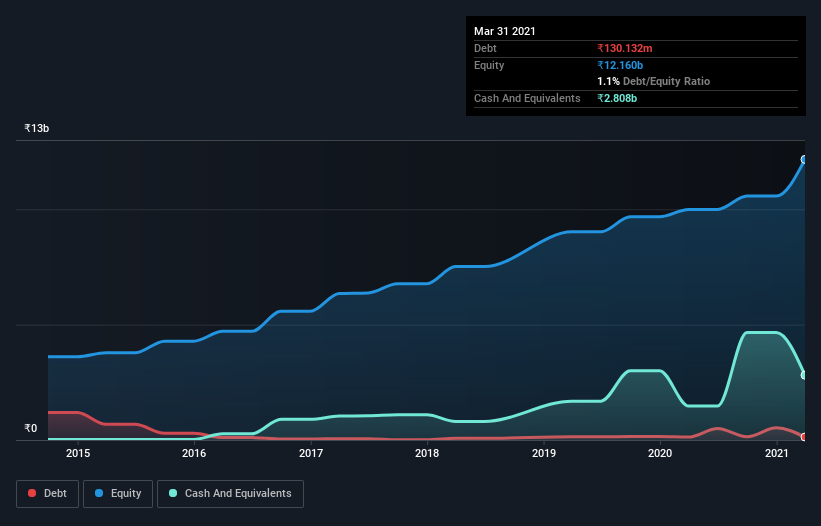
Warren Buffett famously said, 'Volatility is far from synonymous with risk.' So it might be obvious that you need to consider debt, when you think about how risky any given stock is, because too much debt can sink a company. We note that V-Guard Industries Limited (NSE:VGUARD) does have debt on its balance sheet. But should shareholders be worried about its use of debt?
When Is Debt A Problem?
Generally speaking, debt only becomes a real problem when a company can't easily pay it off, either by raising capital or with its own cash flow. If things get really bad, the lenders can take control of the business. While that is not too common, we often do see indebted companies permanently diluting shareholders because lenders force them to raise capital at a distressed price. Of course, the upside of debt is that it often represents cheap capital, especially when it replaces dilution in a company with the ability to reinvest at high rates of return. The first step when considering a company's debt levels is to consider its cash and debt together.
Check out our latest analysis for V-Guard Industries
How Much Debt Does V-Guard Industries Carry?
The chart below, which you can click on for greater detail, shows that V-Guard Industries had ₹130.1m in debt in March 2021; about the same as the year before. But on the other hand it also has ₹2.81b in cash, leading to a ₹2.68b net cash position.

How Healthy Is V-Guard Industries' Balance Sheet?
According to the last reported balance sheet, V-Guard Industries had liabilities of ₹5.93b due within 12 months, and liabilities of ₹662.5m due beyond 12 months. Offsetting this, it had ₹2.81b in cash and ₹3.90b in receivables that were due within 12 months. So its total liabilities are just about perfectly matched by its shorter-term, liquid assets.
Having regard to V-Guard Industries' size, it seems that its liquid assets are well balanced with its total liabilities. So it's very unlikely that the ₹107.4b company is short on cash, but still worth keeping an eye on the balance sheet. Simply put, the fact that V-Guard Industries has more cash than debt is arguably a good indication that it can manage its debt safely.
Also good is that V-Guard Industries grew its EBIT at 17% over the last year, further increasing its ability to manage debt. When analysing debt levels, the balance sheet is the obvious place to start. But ultimately the future profitability of the business will decide if V-Guard Industries can strengthen its balance sheet over time. So if you're focused on the future you can check out this free report showing analyst profit forecasts.
But our final consideration is also important, because a company cannot pay debt with paper profits; it needs cold hard cash. While V-Guard Industries has net cash on its balance sheet, it's still worth taking a look at its ability to convert earnings before interest and tax (EBIT) to free cash flow, to help us understand how quickly it is building (or eroding) that cash balance. In the last three years, V-Guard Industries's free cash flow amounted to 44% of its EBIT, less than we'd expect. That weak cash conversion makes it more difficult to handle indebtedness.
Summing up
While we empathize with investors who find debt concerning, you should keep in mind that V-Guard Industries has net cash of ₹2.68b, as well as more liquid assets than liabilities. And we liked the look of last year's 17% year-on-year EBIT growth. So we don't think V-Guard Industries's use of debt is risky. There's no doubt that we learn most about debt from the balance sheet. But ultimately, every company can contain risks that exist outside of the balance sheet. Case in point: We've spotted 2 warning signs for V-Guard Industries you should be aware of.
If, after all that, you're more interested in a fast growing company with a rock-solid balance sheet, then check out our list of net cash growth stocks without delay.
If you decide to trade V-Guard Industries, use the lowest-cost* platform that is rated #1 Overall by Barron’s, Interactive Brokers. Trade stocks, options, futures, forex, bonds and funds on 135 markets, all from a single integrated account. Promoted
New: Manage All Your Stock Portfolios in One Place
We've created the ultimate portfolio companion for stock investors, and it's free.
• Connect an unlimited number of Portfolios and see your total in one currency
• Be alerted to new Warning Signs or Risks via email or mobile
• Track the Fair Value of your stocks
This article by Simply Wall St is general in nature. It does not constitute a recommendation to buy or sell any stock, and does not take account of your objectives, or your financial situation. We aim to bring you long-term focused analysis driven by fundamental data. Note that our analysis may not factor in the latest price-sensitive company announcements or qualitative material. Simply Wall St has no position in any stocks mentioned.
*Interactive Brokers Rated Lowest Cost Broker by StockBrokers.com Annual Online Review 2020
Have feedback on this article? Concerned about the content? Get in touch with us directly. Alternatively, email editorial-team (at) simplywallst.com.
About NSEI:VGUARD
V-Guard Industries
Manufactures and sells electrical and electronic products in India and internationally.
Solid track record with excellent balance sheet and pays a dividend.

